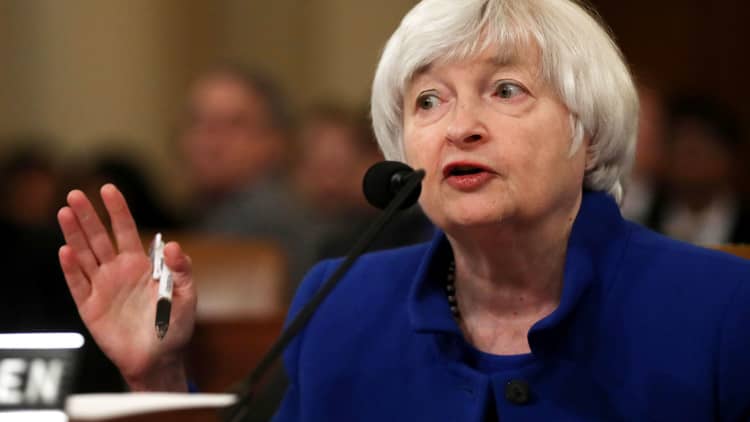
Federal Reserve Chair Janet Yellen called on Congress to adopt policies that will get U.S. economic growth out of its "disappointingly slow" post-recession pattern.
In what is likely her final address Wednesday on Capitol Hill as head of the central bank, Yellen gave mostly positive reviews to economic performance. However, she said there are structural factors that need to be addressed.
Among them are an aging population that has translated to slower labor force growth as well as the "unusually sluggish" productivity growth.
"To generate a sustained boost in economic growth without causing inflation that is too high, we will need to address these underlying causes," Yellen said, according to prepared remarks she will deliver to a joint congressional panel.
"In this regard, the Congress might consider policies that encourage business investment and capital formation, improve the nation's infrastructure, raise the quality of our educational system, and support innovation and the adoption of new technologies," she added.
The Senate is in the midst of debating a Republican-led tax reform plan that cleared a key Senate hurdle Tuesday.
In addition, the Trump administration said it intends to push infrastructure spending as a key component of its pro-growth agenda. The White House also has reduced or eliminated a number of regulations and is likely to seek to roll back some of the banking restrictions implemented following the financial crisis.
As for monetary policy, the Yellen Fed has begun normalizing the highly accommodative measures it took to boost the economy. The Fed has approved four interest rate hikes since December 2015 and begun to reduce its $4.5 trillion balance sheet.
Yellen said "gradual increases" in the Fed's benchmark rate will be appropriate as the economy continues to recover.
Despite her comments about the slow growth, she said the economy "appears to have stepped up" in recent days.
"Moreover, the economic expansion is increasingly broad based across sectors as well as across much of the global economy," Yellen said. "I expect that, with gradual adjustments in the stance of monetary policy, the economy will continue to expand and the job market will strengthen somewhat further, supporting faster growth in wages and incomes."
Yellen faces a question-and-answer session later in the morning.
Her prepared comments were confined to policy expectations and economic observations, and did not address her future. Yellen will leave the central bank in February when her term expires to make way for Fed Governor Jerome Powell, who is expected to be confirmed as the next chairman.
Yellen briefly addressed the issue of rising stock market prices, which have become more of an issue at the Fed recently.
"Asset valuations are high by historical standards," she said, while adding that dangers to the system are "moderate" because of the strength of the banking system and manageable levels of debt and credit.


